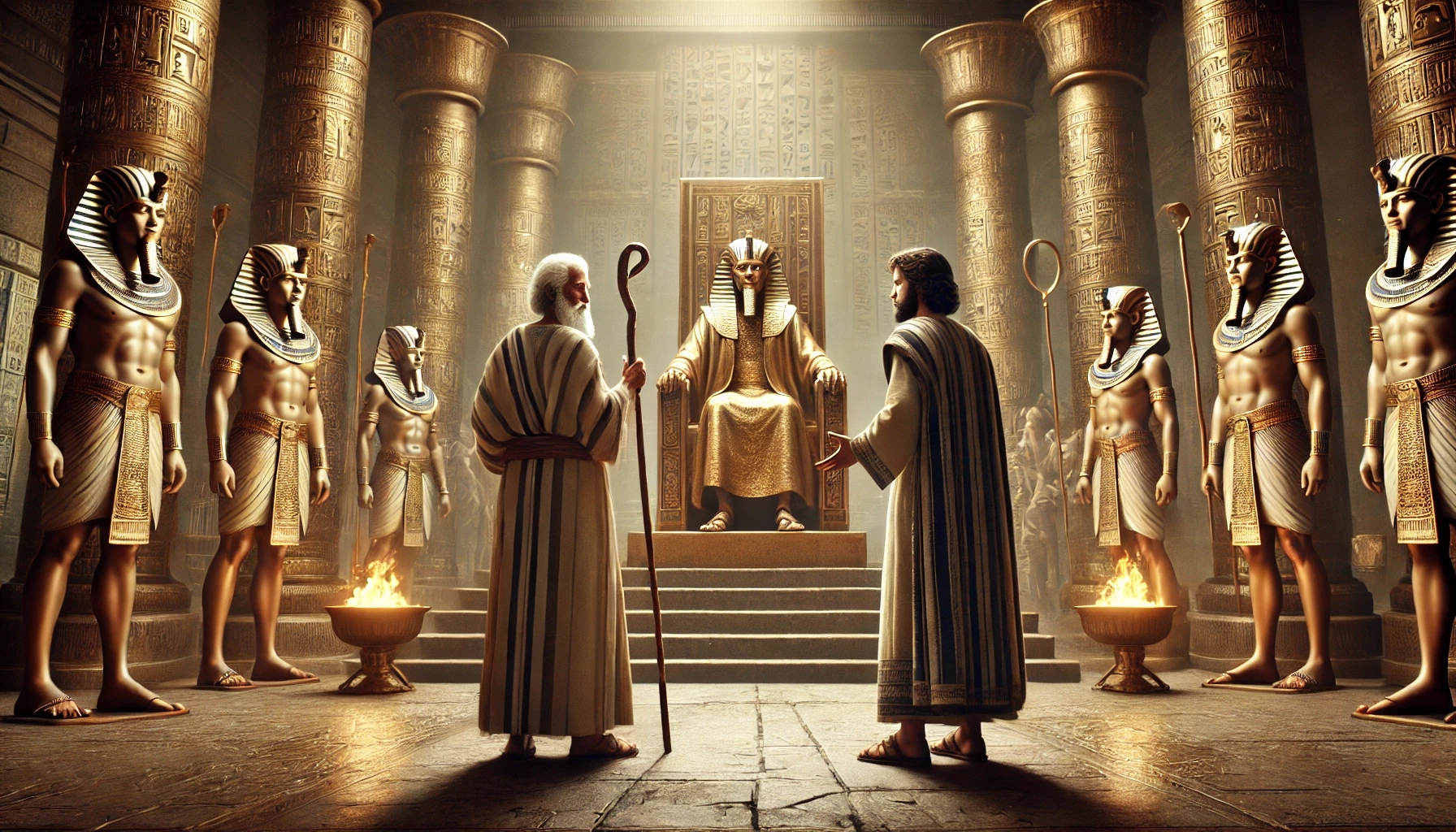 July 15, 2025
July 15, 2025
 DAILY BIBLE READING
DAILY BIBLE READING
 Exodus 40 – God’s Presence Fills the House
Exodus 40 – God’s Presence Fills the House
 The dedication of the Tabernacle shows us how holiness, obedience, and divine order make room for the glory of God
The dedication of the Tabernacle shows us how holiness, obedience, and divine order make room for the glory of God
══════════════════════════════════════════════
 Bible Text – Exodus 39 (KJV)
Bible Text – Exodus 39 (KJV)
1 And the Lord spake unto Moses, saying,
2 On the first day of the first month shalt thou set up the tabernacle of the tent of the congregation.
3 And thou shalt put therein the ark of the testimony, and cover the ark with the vail.
4 And thou shalt bring in the table, and set in order the things that are to be set in order upon it; and thou shalt bring in the candlestick, and light the lamps thereof.
5 And thou shalt set the altar of gold for the incense before the ark of the testimony, and put the hanging of the door to the tabernacle.
6 And thou shalt set the altar of the burnt offering before the door of the tabernacle of the tent of the congregation.
7 And thou shalt set the laver between the tent of the congregation and the altar, and shalt put water therein.
8 And thou shalt set up the court round about, and hang up the hanging at the court gate.
9 And thou shalt take the anointing oil, and anoint the tabernacle, and all that is therein, and shalt hallow it, and all the vessels thereof: and it shall be holy.
10 And thou shalt anoint the altar of the burnt offering, and all his vessels, and sanctify the altar: and it shall be an altar most holy.
11 And thou shalt anoint the laver and his foot, and sanctify it.
12 And thou shalt bring Aaron and his sons unto the door of the tabernacle of the congregation, and wash them with water.
13 And thou shalt put upon Aaron the holy garments, and anoint him, and sanctify him; that he may minister unto me in the priest’s office.
14 And thou shalt bring his sons, and clothe them with coats:
15 And thou shalt anoint them, as thou didst anoint their father, that they may minister unto me in the priest’s office: for their anointing shall surely be an everlasting priesthood throughout their generations.
16 Thus did Moses: according to all that the Lord commanded him, so did he.
17 And it came to pass in the first month in the second year, on the first day of the month, that the tabernacle was reared up.
18 And Moses reared up the tabernacle, and fastened his sockets, and set up the boards thereof, and put in the bars thereof, and reared up his pillars.
19 And he spread abroad the tent over the tabernacle, and put the covering of the tent above upon it; as the Lord commanded Moses.
20 And he took and put the testimony into the ark, and set the staves on the ark, and put the mercy seat above upon the ark:
21 And he brought the ark into the tabernacle, and set up the vail of the covering, and covered the ark of the testimony; as the Lord commanded Moses.
22 And he put the table in the tent of the congregation, upon the side of the tabernacle northward, without the vail.
23 And he set the bread in order upon it before the Lord; as the Lord had commanded Moses.
24 And he put the candlestick in the tent of the congregation, over against the table, on the side of the tabernacle southward.
25 And he lighted the lamps before the Lord; as the Lord commanded Moses.
26 And he put the golden altar in the tent of the congregation before the vail:
27 And he burnt sweet incense thereon; as the Lord commanded Moses.
28 And he set up the hanging at the door of the tabernacle.
29 And he put the altar of burnt offering by the door of the tabernacle of the tent of the congregation, and offered upon it the burnt offering and the meat offering; as the Lord commanded Moses.
30 And he set the laver between the tent of the congregation and the altar, and put water there, to wash withal.
31 And Moses and Aaron and his sons washed their hands and their feet thereat:
32 When they went into the tent of the congregation, and when they came near unto the altar, they washed; as the Lord commanded Moses.
33 And he reared up the court round about the tabernacle and the altar, and set up the hanging of the court gate. So Moses finished the work.
34 Then a cloud covered the tent of the congregation, and the glory of the Lord filled the tabernacle.
35 And Moses was not able to enter into the tent of the congregation, because the cloud abode thereon, and the glory of the Lord filled the tabernacle.
36 And when the cloud was taken up from over the tabernacle, the children of Israel went onward in all their journeys:
37 But if the cloud were not taken up, then they journeyed not till the day that it was taken up.
38 For the cloud of the Lord was upon the tabernacle by day, and fire was on it by night, in the sight of all the house of Israel, throughout all their journeys.
══════════════════════════════════════════════
 Introduction
Introduction
What happens when God truly wants to dwell among us?
Exodus 40 is not just the end of a book – it’s the climax of a long journey: God himself moves in with his people and gives them a place where his presence can visibly dwell.
Everything that happens here is done exactly according to God’s instructions – down to the smallest detail. But it all leads not just to a structure – but to something much greater: the glory of God fills the house.
What happened in the tabernacle back then shows us today how obedience, dedication, and holiness are the prerequisites for experiencing God’s presence – not only in a tent, but in our lives.
══════════════════════════════════════════════
 Commentary
Commentary
 1. God’s Clear Instruction (Verses 1–15):
1. God’s Clear Instruction (Verses 1–15):
God speaks to Moses: “You shall set up the tabernacle.”
Here it becomes clear: the Lord has a specific plan. Everything has its order – the Ark of the Covenant, the table, the lampstand, the veil, the altar of incense, the basin, the burnt offering altar, the anointings – nothing happens randomly.
Every object has meaning, and every step expresses holiness and preparation.
What stands out: Aaron and his sons are washed, clothed, and anointed – they are to serve God, but not unprepared.
 2. Obedience in Every Detail (Verses 16–33):
2. Obedience in Every Detail (Verses 16–33):
Again and again we read:
“As the Lord had commanded him.”
Moses obeys in everything. He sets up, anoints, arranges, lights, washes – nothing is left out.
This shows: God’s presence does not come by chance. It is the result of obedient faith.
The construction is completed not through creativity, but through faithfulness.
 3. God’s Presence Comes in Power (Verses 34–35):
3. God’s Presence Comes in Power (Verses 34–35):
Then the miracle happens:
“Then the cloud covered the tent… and the glory of the Lord filled the tabernacle.”
So much so that even Moses could not enter.
This is not fog, not symbolism – it is God’s real, tangible presence.
The tabernacle, which was just a tent, becomes a place of holiness and revelation.
 4. God’s Guidance Becomes Visible (Verses 36–38):
4. God’s Guidance Becomes Visible (Verses 36–38):
The cloud of the Lord became Israel’s navigation system.
When it lifted, they moved.
When it stayed, they stayed.
God’s presence was visible, dependable, tangible – day and night.
“The cloud of the Lord was upon the tabernacle by day, and fire was in it by night…”
The people lived dependent on God’s presence – not on a calendar, not on their own plan, but on God’s sign.
══════════════════════════════════════════════
 Summary
Summary
Exodus 40 describes the solemn setting up and dedication of the tabernacle – the holy dwelling place of God in the midst of Israel’s camp.
Everything is done exactly according to God’s instruction, and in the end, the glory of the Lord fills the tabernacle.
God’s presence accompanies the people in visible form – a cloud by day, fire by night.
══════════════════════════════════════════════
 Message for Us Today
Message for Us Today
We no longer build tabernacles – but God still seeks dwelling places in our hearts.
This text reminds us:
-
God is a God of order and holiness.
-
He wants to dwell, not just visit.
-
Obedience is the path to God’s presence.
-
His presence leads us – not our own plans.
Just as the tent was prepared back then, so we too should prepare our lives so that God’s Spirit can dwell in us.
══════════════════════════════════════════════
 Reflection Questions
Reflection Questions
 Am I ready to set up my “life tent” so that God’s glory can dwell in it?
Am I ready to set up my “life tent” so that God’s glory can dwell in it? What do I need to cleanse to welcome God’s presence?
What do I need to cleanse to welcome God’s presence? Do I trust that God’s guidance – like the cloud – is reliable and visible?
Do I trust that God’s guidance – like the cloud – is reliable and visible?
~~~~~ ~~~~~
~~~~~
 July 13 – 19, 2025
July 13 – 19, 2025
 WEEKLY SPIRIT OF PROPHECY READING
WEEKLY SPIRIT OF PROPHECY READING
 Ellen G. White │ Patriarchs and Prophets – Chapter 17
Ellen G. White │ Patriarchs and Prophets – Chapter 17
 Jacob’s Flight and Exile
Jacob’s Flight and Exile
 Read online here
Read online here
══════════════════════════════════════════════
 Introduction
Introduction
Jacob does not leave his home as a hero, but as a fugitive—not because of external enemies, but because of inner guilt. And yet, on this very path—full of fear, uncertainty, and self-doubt—God’s faithfulness is revealed in a remarkable way. Chapter 17 of Patriarchs and Prophets vividly describes how God, despite guilt and flight, not only forgives His servant but uses him to fulfill His promises.
══════════════════════════════════════════════
 Commentary
Commentary
 1. Jacob flees – alone, afraid, and broken
1. Jacob flees – alone, afraid, and broken
Jacob leaves his parents’ home out of fear of Esau’s wrath.
He is filled with guilt and remorse, feeling abandoned—by his family and perhaps even by God.
In this solitude, he begins to pray honestly. His prayer is not prideful, but marked by humility and desperation.
 2. Heaven opens – the ladder from heaven (Genesis 28)
2. Heaven opens – the ladder from heaven (Genesis 28)
In a dream, Jacob sees a ladder connecting heaven and earth.
Angels ascend and descend—a picture of God’s service to us.
God Himself stands above the ladder and repeats the promise made to Abraham—now it applies to Jacob!
Jacob not only receives assurance but also a promise: “I am with you… I will not leave you.”
 3. Jacob awakens – from sinner to worshiper
3. Jacob awakens – from sinner to worshiper
Jacob realizes: “Surely the Lord is in this place, and I did not know it!”
He sets up a stone pillar, names the place Bethel (“House of God”), and makes a vow—not as a bargain, but out of gratitude.
He vows to remain faithful, to give a tenth, and to follow God.
 4. Jacob in Haran – faithful despite disappointment
4. Jacob in Haran – faithful despite disappointment
In Haran, Jacob meets his future wife Rachel.
He serves seven years—out of love, faithfully and patiently.
But Laban deceives him. Instead of Rachel, he is given Leah.
Jacob is betrayed—yet he stays.
In total, he serves 20 years, is cheated multiple times, but God blesses him despite all human injustice.
 5. The return – decision in distress
5. The return – decision in distress
Jacob realizes it’s time to return home.
He prays again—remembering God’s promise at Bethel.
God answers: “Return… I am with you.”
Laban pursues him—but God protects Jacob.
A peace covenant is made, marked with the name Mizpah – “The Lord watch between you and me.”
══════════════════════════════════════════════
 Summary
Summary
Jacob begins his journey as a fugitive burdened by guilt, fear, and uncertainty. But God meets him—not with punishment, but with grace. On the difficult road into exile, Jacob grows spiritually, is shaped through trials, and ultimately remains faithful to God. A deceiver becomes a shepherd, a father, and a bearer of the promise.
══════════════════════════════════════════════
 Message for Us Today
Message for Us Today
We too experience times of guilt, loneliness, and uncertainty. We may feel like failures, misunderstood, or taken advantage of. But God does not abandon us.
It is often in the deepest valleys that He reveals His faithfulness.
Jacob’s story shows us:
-
God starts new journeys with broken people.
-
Your past does not determine your calling.
-
God is faithful to His promises—even when we fail.
══════════════════════════════════════════════
 Reflection Question
Reflection Question
-
Have I ever encountered God like Jacob—in the midst of crisis?
-
What is my “Bethel”? Where has God shown me His presence?
-
Am I ready, like Jacob, to entrust God with my life, my gifts, and my tithe?
-
What do I need to let go of today in order to follow God’s call to return?
Source: https://fulfilleddesire.net/15-07-2025-exodus-chapter-40-believe-his-prophets/

 July 15, 2025
July 15, 2025

 ────────────────
──────────────── Bible Text
Bible Text Introduction
Introduction Devotional
Devotional Story: “The Lost Role on Stage”
Story: “The Lost Role on Stage” Reflection on the Story
Reflection on the Story Thoughts – What Does This Mean for You?
Thoughts – What Does This Mean for You? Today’s Reflections
Today’s Reflections Prayer
Prayer Takeaway
Takeaway A good character is worth more than all the gold in the world – nurture it with love and truth.
A good character is worth more than all the gold in the world – nurture it with love and truth.
 Lesson 3: Rough Start
Lesson 3: Rough Start 3.2 A Rough Start
3.2 A Rough Start When deliverance starts with setbacks
When deliverance starts with setbacks Introduction
Introduction Bible Study: Exodus 5:3–23 – Trusting God’s Way Despite Setbacks
Bible Study: Exodus 5:3–23 – Trusting God’s Way Despite Setbacks Question 1: What were the immediate results of the first recorded meeting between Moses and Aaron and Pharaoh?
Question 1: What were the immediate results of the first recorded meeting between Moses and Aaron and Pharaoh? 1. Obedience does not always bring immediate relief—often, it first brings resistance.
1. Obedience does not always bring immediate relief—often, it first brings resistance. God’s paths often go through hardship before leading to freedom.
God’s paths often go through hardship before leading to freedom. 2. A spiritual calling often provokes spiritual resistance.
2. A spiritual calling often provokes spiritual resistance. 3. Disappointed expectations often lead to blame.
3. Disappointed expectations often lead to blame. 4. True leaders turn first to God—even when hurt or confused.
4. True leaders turn first to God—even when hurt or confused. 5. God’s timing is not our timing—but it is perfect.
5. God’s timing is not our timing—but it is perfect. 6. God’s heart remains for His people—even when they doubt and complain.
6. God’s heart remains for His people—even when they doubt and complain. 7. Church unity grows through prayer—not perfection.
7. Church unity grows through prayer—not perfection. Application for Daily Life
Application for Daily Life 1. Don’t expect immediate results – stay faithful despite setbacks
1. Don’t expect immediate results – stay faithful despite setbacks Persevere. Not every work of God bears fruit immediately. Don’t be discouraged if you don’t see the outcome of your prayers or efforts right away. God works in the hidden places. Moses also had to learn: things get harder before they get better.
Persevere. Not every work of God bears fruit immediately. Don’t be discouraged if you don’t see the outcome of your prayers or efforts right away. God works in the hidden places. Moses also had to learn: things get harder before they get better. Thought of the Day
Thought of the Day Illustration – “The Calling in the Shadow of the City”
Illustration – “The Calling in the Shadow of the City” July 14, 2025
July 14, 2025 DAILY BIBLE READING
DAILY BIBLE READING Exodus 39 – Holy to the Lord – The Priestly Garments and the Completed Work
Exodus 39 – Holy to the Lord – The Priestly Garments and the Completed Work The Beauty of Obedience – When Divine Instructions Are Fulfilled with Devotion
The Beauty of Obedience – When Divine Instructions Are Fulfilled with Devotion Bible Text – Exodus 39 (KJV)
Bible Text – Exodus 39 (KJV) Introduction
Introduction Commentary
Commentary Summary
Summary Message for Us Today
Message for Us Today Reflection Questions
Reflection Questions
 July 13 – 19, 2025
July 13 – 19, 2025 1. Jacob flees – alone, afraid, and broken
1. Jacob flees – alone, afraid, and broken Reflection Question
Reflection Question July 14, 2025
July 14, 2025 A Network of Virtuous Influences
A Network of Virtuous Influences Whom are you connecting your heart to?
Whom are you connecting your heart to? ────────────────
──────────────── Bible Verse
Bible Verse Introduction
Introduction Devotional – More than a Like: True Spiritual Connections
Devotional – More than a Like: True Spiritual Connections Story – “The Rope Bridge”
Story – “The Rope Bridge” Thoughts on the Story
Thoughts on the Story Reflection – What Does This Mean for You?
Reflection – What Does This Mean for You? Today’s Reflections
Today’s Reflections Prayer
Prayer Takeaway
Takeaway